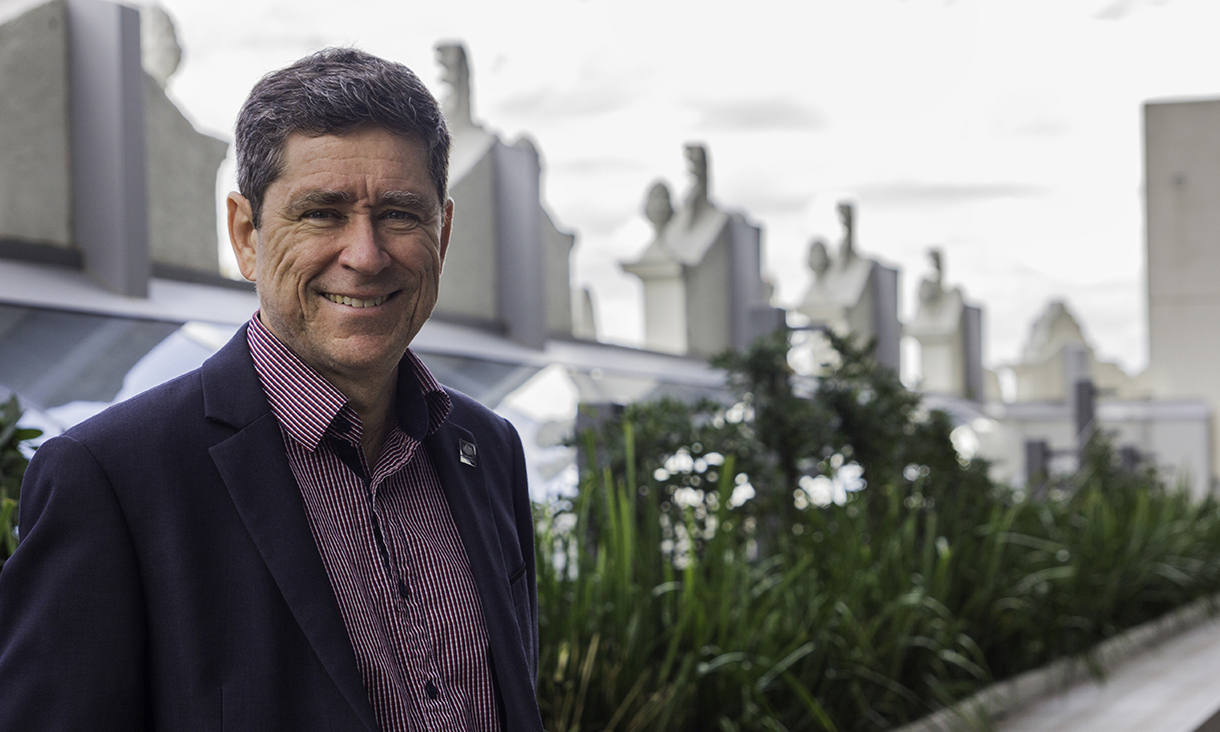Leading astrophysicist receives Swinburne Lifetime Achievement Award

Professor Matthew Bailes has been central to the development of one of the world’s foremost astrophysics and supercomputing centres at Swinburne.
In summary
- Internationally renowned astrophysicist Professor Matthew Bailes has been recognised at the 2020 Swinburne Vice-Chancellor’s Awards with a Lifetime Achievement Award
- Professor Bailes helped establish a leading centre for gravitational wave research at the university
- He also pioneered the use of virtual reality for science and education
Internationally renowned astrophysicist Professor Matthew Bailes has been recognised at the 2020 Swinburne University of Technology Vice-Chancellor’s Awards with a Lifetime Achievement Award.
Professor Bailes has been central to the development of one of the world’s foremost astrophysics and supercomputing centres at Swinburne and has helped establish a leading centre for gravitational wave research at the university.
“Professor Matthew Bailes has been central in putting Swinburne at the cutting-edge of astrophysics,” Swinburne Vice-Chancellor, Professor Pascale Quester says.
“He is also extremely passionate about education and public outreach and has built a team that works to inspire and engage the next generation of scientists.”
Professor Bailes was recruited to Swinburne in 1998 to establish the Centre for Astrophysics and Supercomputing (CAS) research group. He was Director until 2010, overseeing its growth from zero to fifty staff, postdoctoral fellows and PhD students. He also drove the development of Swinburne Astronomy Online.

Professor Bailes pioneered the use of virtual reality for science and education.
“When I was first recruited, the head of my school said; if you come here, you can do anything. And to me, that’s what Swinburne means. It was a place you could do things that were a bit left of field, or out of the textbook,” Professor Bailes says.
He pioneered the use of virtual reality for science and education and was involved in the development of three IMAX films, the first of which, Hidden Universe, was Australia’s sixth-highest grossing documentary within a year of its release.
Professor Bailes also developed supercomputing at Swinburne, designing the first workstation clusters and making them a university-wide and now national resource.

Swinburne’s OzSTAR supercomputer is used by OzGrav in the search for gravitational waves. Its custom paint job, designed by Swinburne graduate Justin Pedler, features gas swirling around two black holes.
Fast radio burst discovery
Professor Bailes’ own research flourished at Swinburne. He has more than 25,000 citations and, together with his former student Duncan Lorimer, discovered a new type of cosmic explosion, called fast radio bursts (FRBs). In 2015 Professor Bailes won an Australian Research Council (ARC) Laureate Fellowship to study FRBs, helping place Swinburne as the leading research centre globally for their future investigation.
In 2015 he was announced as the astronomer leading Australia's role in Breakthrough Listen, a $100 million search for alien life in outer space financed by the late Stephen Hawking and Russian billionaire Yuri Milner.
In 2016 Professor Bailes became the first person to win an ARC Centre of Excellence based at Swinburne for the Centre of Excellence for Gravitational Wave Discovery (OzGrav), which regularly appears in the media for its role in the discovery of sources of gravitational waves.
After leaving the directorship of Astrophysics and Supercomputing Professor Bailes became the Pro Vice-Chancellor (Research) and was twice called upon to act as the Deputy Vice-Chancellor.
From 2021 he will lead Swinburne’s Data Science Research Institute.
-
Media Enquiries
Related articles
-

- University
TEDx is coming to Swinburne: seeking nominations for distinguished alumni to be celebrated
Swinburne will be hosting its first TEDxSwinburne event later this year and will showcase Swinburne's world class innovation and ideas from some of Australia's brightest minds.
Thursday 18 April 2024 -

- University
Swinburne's Social Innovation Institute backs projects on circular economy, ancestry and critical care nursing
Three Swinburne research projects have received seed funding from the Social Innovation Research Institute which helps support and co-create solutions to complex social problems.
Tuesday 23 April 2024 -

- Student News
- University
Swinburne ushers in a new era of student representation
Swinburne has been collaborating with students to improve the student experience and resolve challenges with student representation.
Thursday 18 April 2024 -

- Astronomy
- Science
Swinburne appoints new Director of Innovative Planet Research Institute
Leading geodesy expert, Professor Allison Kealy, has been appointed as the inaugural Director of Swinburne University's Innovative Planet Research Institute.
Monday 22 April 2024 -

- University
Students get first shot in Victoria at entrepreneurial Swinburne Startup Year
Swinburne’s Startup Year will equip students with the skills required to build the foundations of a successful business venture, whilst also earning a qualification.
Monday 22 April 2024

